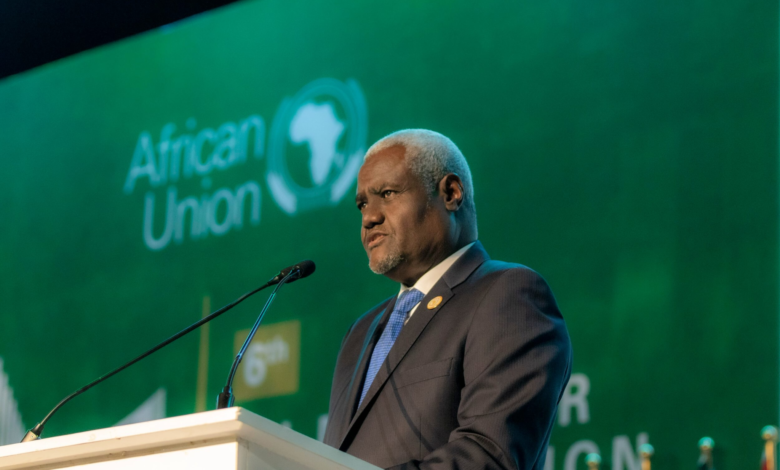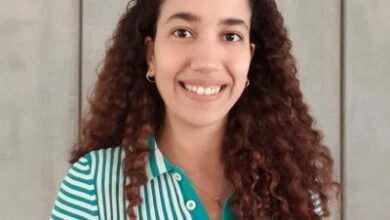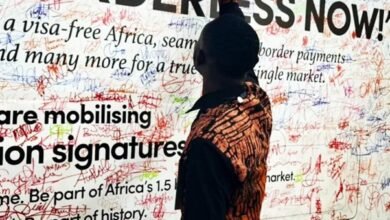Moussa Faki Mahamat : « Africa’s challenges remain immense, but so do our potential and resilience »
Last speech, last message. On February 15, 2025, Moussa Faki Mahamat, who has served as the Chairperson of the African Union Commission since 2017, delivered his final address in this role, marking the end of his mandate. Leading the institution through pivotal years for the continent, he leaves behind a mixed record, balancing diplomatic progress with persistent challenges*.

Your Excellencies, Distinguished Guests, Ladies and Gentlemen,
On behalf of the African Union, I extend my best wishes for health, prosperity, and success to your families and your peoples.
I would also like to express my sincere gratitude to the Chairmen with whom I have worked successively over the past eight years. I am here referring, in the order of their chairmanship, to Alpha Kondé, Paul Kagame, Fattah El-Sisi, Cyril Ramaphosa, Félix Tshisekedi, Macky Sall, Azali Assoumani, Mohamed Ould Ghazouani.
At this moment of remembrance, I cannot forget President Idriss Déby Itno—may his soul rest in peace—who, as a convinced Pan-Africanist, had the initiative of presenting my candidacy to head the Commission and who invested himself unstintingly in such a destiny for me. His tragic death was my most atrocious pain of these two terms.
Eight years of service
Eight years have elapsed since my election at the end of January 2017 as Chairperson of the African Union Commission. At this moment, loaded with historical meaning and symbolism, I would like to fulfill the moral duty of presenting to you the broad outlines of the outcome of these two terms.
Thanks to this journey, I have deeply imbued myself with both what makes the greatness and the influence of our continent and our continental organization, as well as the various constraints and limitations that have hindered our pace.
I feel deeply proud of having visited at least once all the 55 member states of our Union
I have crisscrossed this beautiful and fantastic continent. I feel deeply proud of having visited at least once all the 55 member states of our Union.
The opportunity that this moment affords is historical and unique. I will try to fulfill the dual obligation of reporting and also raising some questions about key issues, being well aware that we must not abuse your precious time.
A consolidated report of our achievements and an annual report have been distributed to you in accordance with our regulations.
The hegemony of globalization does not leave Africa outside the struggles of external powers
The rapid and intense geopolitical upheavals that have characterized the international context during my two terms of office have had both violent and stabilizing manifestations.
The sudden deterioration of the health situation following the outbreak of COVID-19 was unfortunately accompanied by major shocks and profound economic and diplomatic turbulence.
For Africa, this resulted in:
- An increase in the debt burden
- A decline in public and private investment flows
- The collapse of Pan-Africanism and African solidarity
- Obvious deficiencies in governance and leadership
- A crisis of multilateralism
The Russia-Ukraine war that began in February 2022 further darkened this picture, announcing a global geopolitical reconfiguration—a split that resurrected a form of bipolarity, bringing to mind the theoretically outdated reality of the Cold War.
Deep uncertainties about the sustainability of peace and international cooperation have poisoned minds, darkened consciences, and reinforced pessimism, selfishness, and mercantile pragmatism.
Africa, which imported most of its cereal consumption and agricultural inputs from Russia and Ukraine, faced the specter of food and health insecurity that hung over many of our countries, many of which continue to suffer from structural fragilities.
The horrible and unjust war has completely destroyed everything in Gaza and Palestine, depriving this people of its fundamental rights to independence, peace, existence, and life…It deeply questions our humanity
In the Middle East, the brotherly people of Palestine suffered—and continue to suffer—one of the worst injustices in the history of mankind.
The horrible and unjust war has completely destroyed everything in Gaza and Palestine, depriving this people of its fundamental rights to independence, peace, existence, and life.
Despite all this, the valiant Palestinian people have remained stoic, and the African Union remains firmly by their side.
I want to express our solidarity with our brother Abu Mazen.
The apocalyptic landscape that Palestine, the Gaza Strip, and its population—after more than a year of war—continue to endure unfolds in almost total silence from the powers of the world.
Except for the call by some for the systematic deportation of Palestinians from their lands, the response has been silence. It is truly adding insult to injury.
This unprecedented tragedy weighs heavily despite the ceasefire and the release of hostages and prisoners, facilitated by Qatar, Egypt, and the USA.
It deeply questions our humanity.
The hegemony of globalization does not leave Africa outside the struggles of external powers
The hegemony of globalization does not leave Africa outside the struggles of external powers.
On the contrary, the continent is suffering from:
- Prolonged conflicts fueled by external actors
- The expansion of terrorism and violent extremism
- The devastating war in Sudan and eastern DRC
- The political instability in Libya, despite the signing of the reconciliation charter
Tensions persist in:
- The Sahel
- The Lake Chad Basin
- The Gulf of Guinea
- Mozambique
- The Horn of Africa
- The Great Lakes region
The flow of refugees and internally displaced persons is exacerbating already fragile security, food, and health situations in many member states.
Institutional reform and Agenda 2063
The institutional reform of our Union, which began in 2017, aimed to create the optimal conditions to guarantee the efficient pursuit of Agenda 2063, our strategic roadmap.
The reform focused on:
- Reconfiguring leadership
- Evaluating staff performance
- Strengthening cooperation between the AU and regional economic communities
- Institutionalizing the Coordination Summit
- Ensuring financial transparency and compliance with budgetary rules
In this regard, I want to express my gratitude to President Paul Kagame and President William Ruto for their remarkable efforts in advancing this reform.
Sectoral progress and health initiatives
An assessment of the first 10-year implementation plan of Agenda 2063 (2014–2023) reveals the sectoral progress made towards « The Africa We Want. »
In health, the Africa CDC has established itself as the most effective instrument in the fight against diseases, particularly during the COVID-19 pandemic.
However, the financing of health services remains a concern. We have designed two mechanisms for:
- Financing universal health coverage
- Combating malnutrition on the continent
With the support of the African Veterinary Vaccine Center (PANVAC), efforts continue to ensure a more resilient health sector in Africa.
“With unity, bold reforms, and strategic actions, we will continue our march towards a stronger, prosperous, and united Africa”
As I conclude, I reiterate my unwavering commitment to our continent and its people. Africa’s challenges remain immense, but so do our potential and resilience.
With unity, bold reforms, and strategic actions, we will continue our march towards a stronger, prosperous, and united Africa.
Thank you.
*Moussa Faki full speech during 38th African Union Summit






